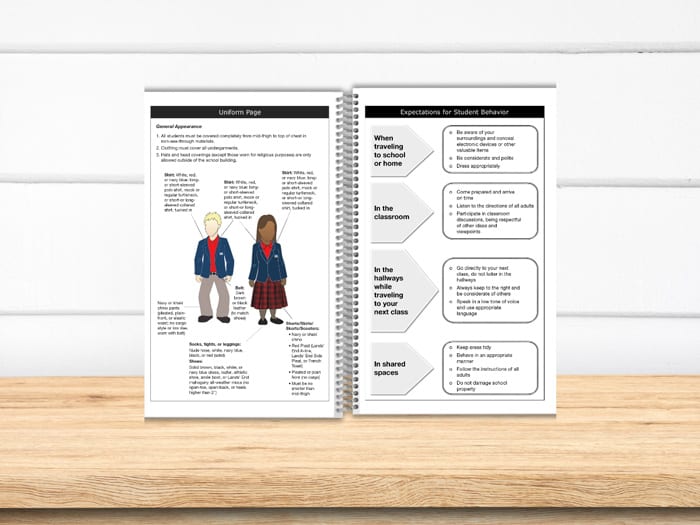Students deserve an education that will not only prepare them for college, but also for the rest of their lives. In order to do this they should be given responsibilities, such as classroom jobs and group projects, which foster a sense of accountability. While this may not be easy to accomplish, the following strategies are a good place to start.

1. Creating Expectations
From the first week of school, create the classroom norms with your students so that they play a vital role in writing the rules that they will be expected to follow. Start with an activity about their goals for the school year. Refer to these as you allow them to think about the necessary steps to getting there. Show them that achieving their goals is a process and will require them to be on task, complete the work, ask questions and work hard. Have your students sign it, like a classroom contract, and hang it up in the room so they feel a sense of ownership in the way the classroom is run.
2. Sharing Expectations
The expectations should also be outlined in a guidebook, preferably something with easy access like a school planner. Both classroom rules and school-wide policies, requirements, rewards and consequences should be listed clearly, with examples of positive behaviors. Students need to know what “success” looks like before being held responsible for it and should be able to refer to it all year. At the beginning of the year, teachers may choose to construct a quiz or performance assessment, such as skits or student-created posters, based on these expectations to give students a chance to practice and share them.
3. Student Improvement Plans
Feeling accountable at school means feeling invested in one’s learning and improvement. Self-tracking methods are key components of creating long-lasting meaning and positive habits out of the learning process.
Encourage students to design their own plans for areas of improvement, academic or behavioral. The plans may be stored in a student planner where parents, teachers and students can sign it. It can be a daily, weekly or monthly plan, depending on the student and the necessity. Teachers can meet periodically with students to review progress and discuss strategies for improving performance and expanding the goal.

4. Skills Tracking
As a precursor to the improvement plan, teachers can create charts for each subject and marking period with specific standards, such as “writing a five-paragraph informational essay” or “adding and subtracting fractions.” After each assessment or test, students can mark their own grades and check off which skills they feel they have mastered and note which ones they need to improve on. They can compare this with the teacher’s notes during student-teacher conferences and parent-teacher conferences.
5. Reading Log
Independent reading is a huge part of the comprehensive framework in ELA and across subjects, but is the hardest to keep track of. Provide students with a reading log to keep track of reading dates, times, materials (e.g., library books, magazines, etc.), and page numbers, and tie these to various comprehension skills that students are responsible for learning.
Add in sections for summaries and opinions about the reading. Keeping these in a school planner makes it easy for teachers to check them on a weekly basis and provide rewards at each benchmark, such as reading a certain number of pages or completing a book.
6. Homework Log
Require students to record daily assignments in a homework log inside their student planners. Build this activity into the routine — either in the morning or the end of the school day. Before they go home, review the homework with the entire class so that every student becomes responsible for those assignments. The following day, collect the homework and sign the log to indicate completion. This process will give you the opportunity to discuss, one-on-one, why an assignment was not done and will hold the student directly accountable for missing or incomplete homework.
Empowering students to take responsibility for their own learning isn’t always an easy task but it is essential. Once students feel a sense of ownership and control over their academic success they will be more invested in the learning process. Customized school planners can serve as a tool for holding students accountable for following school policies and procedures, completing homework and class assignments, attendance, and much more. Request a free sample pack to discover the benefits of customized school planners.
Time Management Tools & Strategies for Students
Effective time management is essential for academic success. By employing strategic tools and techniques, students can optimize their productivity and maintain a balanced lifestyle. Here are some key strategies to help students manage their time effectively:
Time Blocking Techniques for Academic Success
Time blocking is a powerful time management tool for students that involves dividing your day into specific blocks of time, each dedicated to a particular task or activity. Here’s how to implement time blocking for academic success:
- Identify Key Tasks: List all the tasks you need to accomplish, including homework, study sessions, extracurricular activities, and personal time.
- Allocate Time Slots: Assign specific time blocks for each task. For example, you could dedicate:
- 9:00 AM to 11:00 AM for studying math
- 11:00 AM to 12:00 PM for a project
- 1:00 PM to 2:00 PM for extracurricular activities
- Stick to the Schedule: During each time block, focus solely on the assigned task. Avoid the temptation to attempt multitasking and minimize distractions to maximize productivity.
- Include Breaks: Schedule short breaks between time blocks to rest and recharge. Use techniques like the Pomodoro Technique, which includes 25 minutes of focused work followed by a 5-minute break.
- Review and Adjust: At the end of each week, review your time blocks to see what worked and what didn’t. Adjust your schedule as needed to improve efficiency and accommodate any changes in your workload.
Prioritizing Tasks: The Eisenhower Matrix Method
Prioritizing tasks effectively is crucial for managing your time well. The Eisenhower Matrix is a time management tool for students that helps categorize tasks based on their urgency and importance:
1. Urgent and Important
Tasks in this category require immediate attention and are critical for achieving your goals. Examples include upcoming exams, assignment deadlines, and urgent project work. These should be your top priority.
2. Important but Not Urgent
These tasks are essential for long-term success but don’t require immediate action. Examples include studying for future exams, long-term projects, and skill development activities. Schedule these tasks into your routine.
3. Urgent but Not Important
Tasks that are time-sensitive but don’t significantly contribute to your major goals. Examples include some emails, minor chores, and certain social activities. Try to delegate these tasks if possible or limit the time spent on them.
4. Not Urgent and Not Important
These tasks have little to no value and can often be eliminated. Examples include excessive social media use, unnecessary meetings, and non-essential distractions. Minimize or eliminate these tasks to free up time for more important activities.
Balancing Extracurricular Activities with Studies
Extracurricular activities and academic responsibilities are essential for a well-rounded student life, but keep in mind that it’s important to balance both for optimal efficiency and performance. Here are some tips to help you manage both effectively:
Use a paper planner or digital calendar to map out your entire week, including classes, study sessions, extracurricular activities, and personal time. Having a visual representation of your commitments helps identify potential conflicts and plan accordingly. Determine which activities are most important to you. Academics should be a priority, but extracurriculars that contribute to personal growth and enjoyment are also valuable. Allocate sufficient time for both.
Limit Commitments Where Possible
On the one hand, high school and college are the perfect time to take advantage of extracurricular activities that can contribute to a well-rounded resume, active social life, and overall happier outlook on life. At the same time, you don’t want to overwhelm yourself with nonessential expectations during what should be a very productive season of your life.
Be selective about the number of extracurricular activities you participate in. Overcommitting can lead to burnout and negatively impact your academic performance. Focus on a few activities where you can make a meaningful contribution or which are most meaningful to you. This may include:
- Dedicated dinners with family or friends on specific days or special occasions
- Being involved in a particular activity, sport, or hobby that is productive or which contributes positively to your mental health
- Important health and wellness check-ins or opportunities for self-care
- Opportunities to add meaningful experience to your resume, such as an occasional volunteer opportunity in your community
Communicate with Teachers, Coaches, Advisors, & Mentors
If you’re struggling to balance your academic responsibilities and extracurricular activities, it’s important to reach out for support. Talk to your teachers, coaches, or advisors about your challenges. They can offer valuable guidance and practical advice to help you manage your time more effectively.
Additionally, they might be able to provide flexibility in your commitments, such as adjusting deadlines, offering extensions, or helping you prioritize tasks. These mentors have experience and insight that can help you develop strategies for maintaining a healthy balance, ensuring that you can succeed academically while still enjoying and benefiting from your extracurricular activities. Don’t hesitate to seek their help; their support can make a significant difference in your overall well-being and success.
Regularly Review Your Schedule
Finally, regularly review your schedule for the week and periodically assess your schedule to ensure you’re maintaining a healthy balance between academics and extracurriculars. Make adjustments as needed to stay on track and avoid overloading yourself.
Request a Custom School Planner Quote or Sample Kit
Implementing these time management strategies can help students navigate their academic responsibilities and extracurricular activities effectively, leading to a more productive and balanced school experience.
Interested in finding out how custom school planners can work for your school? Request a quote or sample kit today to start your school’s journey towards reaching academic goals.